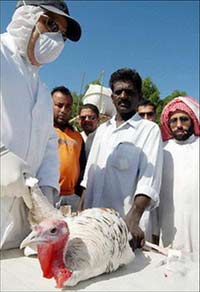Avian influenza has reached the Middle East following Kuwait’s report of its first two cases. Meanwhile, on November 10, China also reported its fourth outbreak of avian flu in Liaoning Province within the past two weeks, amid concerns that counterfeit avian flu vaccines entering the market could worsen the situation.
 |
Collecting blood samples from a chicken for avian flu testing at a poultry market in Kuwait City |
Kuwait officials reported detecting avian influenza in an imported peacock and a wild flamingo. They stated that these birds were infected with the H5 virus, but it has not yet been confirmed whether they carry the dangerous H5N1 strain.
In China, the newly identified outbreaks yesterday raised the total number of reported avian flu outbreaks in the country to seven. Officials indicated that 670,000 poultry have been culled in farms near the Jinzhou and Fuxin areas. These outbreaks occur amid concerns that counterfeit avian flu vaccines could exacerbate the epidemic.
“Fake vaccines worsen the situation. We are now seeing infected chickens showing no symptoms, which is very concerning,” stated Peter Cordingley, spokesperson for the World Health Organization (WHO).
China has not reported any human cases of avian influenza yet. However, experts say it is almost inevitable that humans will become infected given the number of infected poultry. The Ministry of Agriculture in China has reported that authorities have quarantined 116 individuals after the lethal H5N1 virus was found in dead poultry at the new outbreak sites.
T.VY (According to CBC News, AP, CNN)




















































